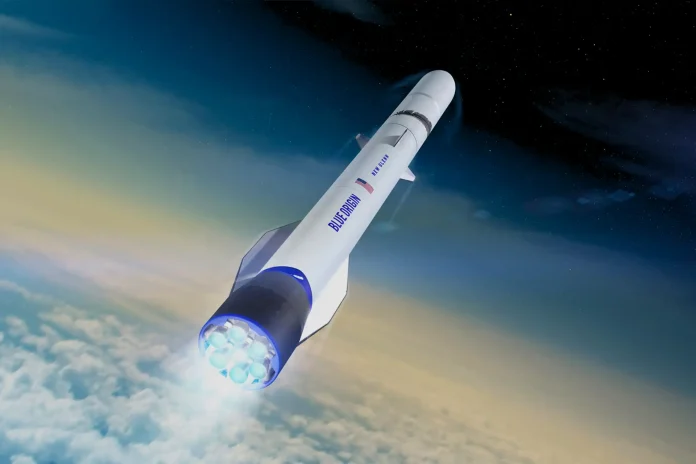Blue Origin, the private space exploration company founded by Amazon’s Jeff Bezos, has taken another step towards the inaugural launch of its New Glenn rocket. The massive vehicle recently rolled out to the launchpad at Blue Origin’s Launch Complex 36 in Texas for a series of critical tests. This marks a significant milestone in developing the New Glenn, which is designed to compete with SpaceX’s Falcon 9 and other heavy lift launch vehicles.
New Glenn Rocket: New Powerful Player in the Market
Standing at 328 feet estimated (100 meters) tall and boasting a diameter of 23 feet (7 meters), the New Glenn is a powerful force in the launch vehicle market. Its BE-4 engines, powered by liquefied natural gas and liquid oxygen, can generate a staggering 2.1 million pounds of thrust at liftoff. This immense power allows the New Glenn to carry up to 45 metric tons of cargo to low-Earth orbit, making it suitable for a wide range of missions, from launching large satellites to deploying human spacecraft.
Related: Blue Moon Lander Contracted for NASA New Artemis 5 Mission
Series of Rigorous Tests Before Takeoff
While the rollout to the launchpad is an exciting development, it represents only the beginning of the journey for the New Glenn. The vehicle will now undergo a series of comprehensive tests designed to ensure its readiness for flight. These tests will encompass a multitude of aspects, including:
Engine hot fire tests:
These tests involve igniting the BE-4 engines on the launchpad to verify their performance and functionality in a simulated launch environment.
Vehicle systems checks:
Engineers will carefully examine and test all onboard systems to guarantee proper operation, including flight control, avionics, and communication equipment.
Wet dress rehearsals:
During these rehearsals, the New Glenn will be fully fueled with propellants to simulate the launch countdown and practice all pre-launch procedures.
New Glenn Rocket Launch Date:
Once these tests are completed successfully, Blue Origin will set a new Glenn rocket launch date for its first voyage. The company has not officially revealed a specific date, but industry analysts anticipate a launch sometime later in 2024.
A Long-Term Vision for Space Exploration
The successful launch of the New Glenn will signify a significant achievement for Blue Origin and its ambitions in the space industry. However, the company’s vision extends far beyond this initial milestone. Blue Origin aspires to utilize the New Glenn as a critical element in its long-term plans for space exploration, competing with the gigantic Falcon 9. The company aims to use the New Glenn’s capabilities to:
Support the development of reusable launch systems:
Blue Origin is actively developing reusable launch vehicles, and the New Glenn is envisioned as a stepping stone towards this goal. The experience and insights gained from operating the New Glenn will be crucial for developing future, fully reusable launch systems.
Enable human spaceflight:
Blue Origin envisions the New Glenn playing a role in facilitating human space missions. The company is currently developing the New Shepard suborbital vehicle for space tourism experiences, and the New Glenn could potentially be used for future orbital human spaceflight adventures.
Advanced space infrastructure development:
Blue Origin is committed to contributing to the establishment of a powerful space infrastructure. The New Glenn’s payload capacity could be utilized to deploy critical infrastructure components, such as communication satellites and space stations, paving the way for a more permanent human presence in space.
The rollout of the New Glenn to the launchpad signifies that Blue Origin is ready to make its name in the space industry. The upcoming test campaign and the eventual launch of the New Glenn rocket will be closely watched by the space community, as it represents a major player entering the heavy lift launch market and holds the potential to contribute significantly to the future of space exploration.



